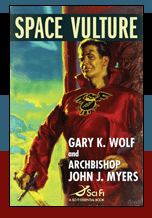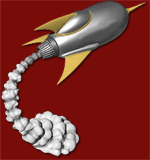 |

|
|||||
Space VultureREVIEW SUMMARY: A really fun throwback to the pulp science fiction of yesteryear. MY RATING: BRIEF SYNOPSIS: Space Marshal Victor Corsaire battles the legendary space pirate known as Space Vulture. MY REVIEW: PROS: Perfectly recaptures the pulp feel; fun sf adventure suitable for any age. CONS: Believability stretched too far in the case of Gil, whose turnaround was marred by a contrived plot decision. BOTTOM LINE: A welcome return to the stuff of old-time wonder. Space Vulture is the result of collaboration between Gary K. Wolf and Archbishop John J. Meyers; two childhood friends who discovered a mutual affection for science fiction. The book that hooked them was the 1952 space adventure Space Hawk written by Anthony Gilmore (a pseudonym for Harry Bates and Desmond W. Hall, Editors of Astounding Stories of Super Science). Space Vulture was intentionally written as homage to the pulpy sf days of yesteryear and contains much of its style and lure. The hero of the story is Victor Corsaire, Space Patrol's best lawman and perennial do-gooder. As the book opens, Corsaire is closing in on small-time crook Gil Terry, a petty thief with troubles of his own. Gil owes someone money who, as collateral, took Gil's arm and eye and replaced them with prosthetics; specifically an insectoid alien arm and a mechanic telescopic eye - both of which lending Gil a creepy persona. Shady Gil is trying to steal a valuable haul of space mushrooms on the colony planet of Verlinap to repay his debt and get his parts back. Not that Cali Russell cares; she's the peacekeeper on Verlinap, trying to eke out a good life for her sons, Eliot and Regin, and she's got little patience for Gil, Corsaire, or their longtime rivalry. But even Gil is relatively small potatoes when compared with the legendary evils practiced by the most feared pirate villain of all the spaceways: Space Vulture! Space Vulture is painted like a comic book villain. He's augmented and enhanced in every conceivable fashion, his only flaw (besides the evil he perpetrates, of course) being the size of his ego. Even Corsaire has a bit of an ego, so there is a bit of a battle of machismo that underlies the encounters between Corsaire and Space Vulture. But as the story progresses, the characters do grow: Corsaire, for example, learns that there is room in life for relationships; Cali learns that not all men are the same; even Gil learns to relax his "Me First" attitude when he is forced to look after young Eliot (a smart kid who can somewhat hold his own) and Regin (a more malleable youngster who sees glamour in Gil's devil-may-care lifestyle). Pulp science fiction never took great pains to make an airtight plot; it was all about the adventure. In doing so, it often pushed the limits of believability in a self-induced spiral of one-upmanship. The same could be said here. The sequence of events is all done for the sake of adventure, common sense be damned. It would have been easy for Space Vulture to immediately dispense with goody-two-shoes Corsaire any number of times, but something always managed to save him: a more evil plan here, a diversion there, whatever was convenient. The same stretch of believability happened with Gil, though in his case it went against the painstaking turnaround his character went through. Just when you think that Gil has turned over a new leaf, he's back to his old ways again - for no apparent reason besides having him come back to save the day, which he couldn't do if he had been around the whole time. Such moments are contrived, to be sure, but then that's all in the true spirit of pulp sf, isn't it? Still, in Gil's case, it seemed that the contrived nature of pulps was pushed a bit too far. Space Vulture is the kind of book you could safely throw at a kid to get him hooked on science fiction without fear of objectionable content. Some of the rougher elements of adult-targeted pulps have been softened and Cali, who would have been portrayed as the damsel-in-distress decades ago, is a tough woman who can hold her own. Also worth noting: some characters are portrayed as being religious, thanks to Archbishop Meyers, no doubt. This "sanitization" doesn't hurt the book or the desired pulp feel, but it is nevertheless noticeable. What the authors set out to do was recreate the pulp sf of yesteryear and they succeeded. The awesome Glen Orbik cover art even adds to that flavor. Older fans of pulp sf will like it for the feeling that's been recaptured. Correspondingly, people who dislike pulp sf probably won't be interested in what's been done here. But if you like laser blaster fights, killer robots, poison darts, mind-controlled minions, lizard aliens, and more, then Space Vulture delivers because readers get exactly what they'd expect: a really fun sf adventure book. This is a welcome return to the stuff of old-time wonder. — John DeNardo, SF Signal
|
|||||
| The Book | The Story | The Characters | Two Boys | The Authors | The Origin | New Pulp Traditions Articles | Reviews | The Sonic Room | Purchase | Contact Us © 2007-2011 Gary K. Wolf and Archbishop John J. Myers. All rights reserved. Privacy Policy |
